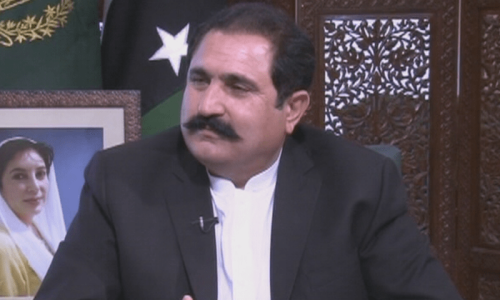Interior Minister Ahsan Iqbal on Wednesday lashed out at Pakistan Tehreek-i-Insaf (PTI) chief Imran Khan for criticising the change in the Khatm-i-Nabuwwat declaration in the Elections Act 2017, saying PTI members were part of the panel that drafted the legislation.
Khan, who held a press conference earlier in the day and said his workers wanted to join the Faizabad sit-in, was the target of the interior minister's presser for the most part.
The minister claimed that the PTI was part of the entire procedure of getting the Elections Act 2017 through the parliament as four of its members, and Khan's "political teacher" Sheikh Rasheed, were a part of the 34-member committee that wrote the legislation.
"All members gave their viewpoints when the law was drafted but none of your [Khan's] party members gave any suggestion or amendment about Khatm-i-Nabuwwat," he said.
Iqbal said Hafiz Hamdullah pointed the change in the Khatm-i-Nabuwwat declaration and despite the law minister explaining that there had been no substantive change, said that it should be brought back to its original form.
"The government supported the amendment and voted in its favour but PTI votes were among the 34 who voted against it," Iqbal said.
"Imran Khan, you are trying to cheat the nation," he added.
He said that it was important to disperse the sit-in because it could have fanned sectarian violence and chaos. "But Imran Khan wants to do politics on this as well."
"What action have you taken against corruption in Khyber Pakhtunkhwa?" Iqbal asked the PTI chief, whose party has been in power in the province since 2013.
He alleged that Khan had always supported corruption within his party and had collected the most corrupt people in the country under his umbrella.
"Did you ever try to appoint the five people you suggested for NAB chairman as the head of accountability commission in the KP?"
Instead, he said, the PTI chief had removed the accountability commission head when he attempted to hold provincial ministers accountable. Iqbal added that justice Wajihuddin was removed as the party's election commissioner when he pointed out election rigging by party bigwigs instead of any action being taken against them.
Similarly, he said, when Bank of Khyber gave an advertisement against KP cabinet members, accusing them of corruption, Khan did not remove the ministers, but targeted the bank.
Minister clarifies end of operation
Iqbal claimed during the press conference that the protesters in Faizabad were carrying firearms and "objects that protesters do not carry ordinarily".
Iqbal confirmed the reports that a large group of protesters had attacked the police with tear gas when they had almost cleared the area.
"When police reached near the stage, they had to face the worst possible shelling which was something they had not anticipated," Iqbal clarified. "Moreover, due to the live media coverage of the operation people had started to join from Rawalpindi."
"We stopped the operation to prevent bloodshed as the court had barred the administration from using firearms, however, weapons were recovered from the possession of the protesters," he said.

The interior minister said that the government was investigating the incident.
A BBC Urdu report had quoted police officials as saying that a trained group of hundreds of people had suddenly attacked police when they were barely 50 feet away from the sit-in leadership.
"Whenever there is an unusual situation or an emergency, civil and military institutions have the capacity to deal with it together, the terms of which are already clear," the minister said.
Regarding the provision of travel fares to the freed protesters by Director General (DG) Punjab Rangers Azhar Naveed, Iqbal said that he was not consulted by the Rangers official before handing the envelopes out.
The interior minister said he will request the DG Rangers to explain his position and "also request him to have similar meetings in press clubs as well".
After the weeks-long protest, which virtually paralysed the capital and led to several people losing their lives, the government had finally bent its knee before the protesters on Monday after Zahid Hamid resigned from his post as federal law minister.
The minister's resignation came in the aftermath of Saturday’s botched operation against protesters at Faizabad and 'successful negotiations' with leaders of the demonstration late on Sunday night.
Six people were killed while hundreds were injured during the operation. The terms of the agreement included blanket immunity for all those arrested during the crackdown on the agitating protesters.
The agreement between the government and the protesters to end the sit-in has subsequently faced much criticism.
Most prominently, Islamabad High Court judge Justice Shaukat Aziz Siddiqui had on Monday lashed out at the government as well as the army for mediating the agreement.
"The army chief, instead of following the orders of the chief executive, became a mediator," Justice Siddiqui had pointed out as he sharply reprimanded the armed forces for straying out of their constitutional role.
"Who is the army to adopt a mediator's role?" inquired the judge. "Where does the law assign this role to a major general?"















































